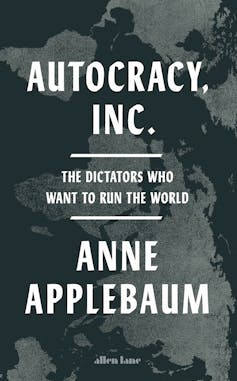Could the world’s autocrats successfully plot to defeat the West?
- Written by Oleg Beyda, Hansen Lecturer in Russian History, The University of Melbourne

Three decades ago, many liberals proclaimed victory for democracy and a “rules-based international order”. But today the majority of the world’s population live in countries that are only partially free, or are under one form or another of autocratic rule.
Why are autocracies on the rise? In her new book, Autocracy, Inc., Pulitzer prize winner Anne Applebaum provides an answer: there is a “network” among the world’s autocrats, who use the clandestine routes of our interconnected world to further their aims and undermine democracy.
Review: Autocracy, Inc.: The Dictators Who Want to Run the World – Anne Applebaum (Allen Lane)
Autocracy Inc. is a club of dictators and their states, Applebaum writes. Like the concept of “autocracy” itself, this incorporation is loose and fluid. The club’s members are not bound by any ideological kinship or constitutional structure. Among them are hard dictatorships (like Belarus, China, the Islamic Republic of Iran and the Russian Federation), and hybrid illiberal democracies or softer autocracies (like Turkey, Singapore, India, the Philippines and Hungary).
For some reason, Applebaum does not pay a comparable share of attention to the Arab monarchies (which do not seek the end of democracy), nor to the hybrid regimes.
Deals, not ideals, drive the autocrats together, according to Applebaum. Their collaboration is based on a common obsession with power and money. They face off against a dwindling group of democracies, which they try to undermine by all available means.
At times, this confrontation leads to war, as in Ukraine. To Applebaum, Russia’s war against Ukraine is the first battle in a larger war. It is part of “a conscious plan to undermine the network of ideas, rules, and treaties” that have defined the now nearly extinct liberal world order.
Are they really all in cahoots?
Unfortunately, though stylishly written, this book hardly lives up to the high standards Applebaum’s readers have come to expect. She does not provide tangible evidence of the autocrats nurturing master plans or consistently coordinating their actions. Her sources are frequently media reports, around which she drafts plausible assumptions.
In Applebaum’s narrative, the autocrats exchange visits, covet power, hate liberal principles and democracy, help each other survive through media manipulation, and teach each other the “dark art of sanctions evasion”.
For example, the Bolivarian Republic of Venezuela could not be more different from the Islamic Republic of Iran, yet these two members of Autocracy Inc. find common ground in anti-Americanism, “shared grievance”, and “a shared interest in clandestine petroleum sales”.
By extension, it seems like all the other members are in cahoots too. But are they? The autocrats’ unity is muddled by their own constantly clashing interests. Their malfeasance is limited by their incompetence.
The key issue with Applebaum’s analysis is that contradictions in her theory fail to appear. Too much of the book proceeds via omission and conflation. It often patches up observed plausibilities with the author’s own idealism, presenting them as certainties.
The autocracies, says Applebaum, not only keep tabs on the progress of the club members, but also time “their own moves to create maximum chaos”.
In the autumn of 2023, additional aid to Ukraine stumbled in the European Union and the United States, due to the opposing efforts of “minorities with deep Russian ties, led respectively by Viktor Orbán in Hungary and by a handful of MAGA Republicans in Congress”. At the same time, Applebaum writes, Iranian-backed Hamas conducted a terrorist attack against Israel.
To me, it is not clear who the “minorities” were, nor the nature of their alleged ties to Russia. More importantly, Applebaum does not tell us why Iran would attempt to aid the anti-Ukrainian efforts of these minorities.
Applebaum clearly knows her theory is not as clear-cut as it might seem. She admits “there are no ‘blocs’ to join and no Berlin Walls marking neat geographic divides”.
Yet bloc thinking persists. Applebaum never asks whether the autocrats have the capacity – logistical, psychological, military or otherwise – to mount a coordinated attack on “the West”. After all, autocracies continue to develop strategic cooperation with the same countries they deplore. The global West depends on China for a lion’s share of production and the Russian Federation continues selling natural resources that are re-sold later.
Autocracies remain transactional. They respond to any incursion into their own perceived sphere of power, whichever political camp or movement it is coming from – not just from the “liberals”.
An exposé of the ‘grey zone’
For a non-specialist audience, Autocracy Inc. presents an intriguing, if morbid, exposé of the “grey zone” autocrats operate in. At times, Applebaum makes an interesting point, only to drop it later on.
Discussing the post-1991 era of business expansion in Eastern Europe, Applebaum spends some time on the future Russian president Vladimir Putin, who was then deputy mayor of Saint Petersburg. According to her, even then, Putin had a “close-knit cabal” around him, biding his time to restore an authoritarian regime.
During the 1990s, the future autocrat was exposed to the double standards of Western democracies. As long as there was money, those democracies were only too happy to provide help for establishing illiberal regimes abroad.
Read more https://theconversation.com/could-the-worlds-autocrats-successfully-plot-to-defeat-the-west-238894



















